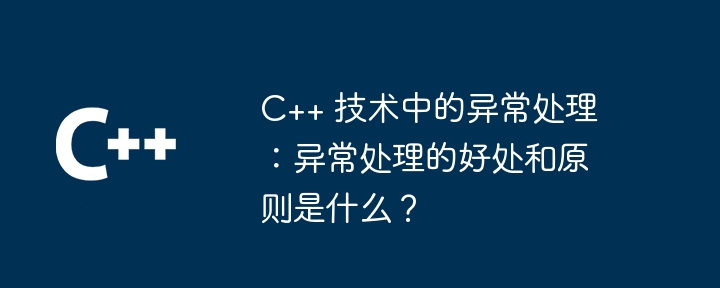Home >Backend Development >C++ >Exception handling in C++ technology: What are the benefits and principles of exception handling?
Exception handling in C++ technology: What are the benefits and principles of exception handling?
- WBOYWBOYWBOYWBOYWBOYWBOYWBOYWBOYWBOYWBOYWBOYWBOYWBOriginal
- 2024-05-09 14:54:01871browse
Exception handling in C enhances code robustness, readability, maintainability, and error propagation. Principles include: keeping exceptions safe, handling them promptly, handling them correctly and avoiding misuse. In practical cases, the try-catch block is used to catch exceptions where the divider is zero and take appropriate handling measures based on the exception type.

Exception handling in C technology: Benefits and principles of exception handling
Exception handling is an important function in C. It allows a program to continue running without interrupting when an abnormal event occurs. Abnormal events include various errors such as insufficient memory and file not found.
Benefits of exception handling
- Enhance code robustness: Exception handling enables the code to take appropriate actions when encountering abnormal situations reaction, thus improving the robustness of the code.
- Improve code readability and maintainability: By separating exception handling code from normal execution code, you can improve code readability and maintainability.
- Error propagation: Exception handling allows errors to propagate through the program so that they are handled at the appropriate place and time.
Principles of exception handling
- Exception safety:Always ensure that the code remains safe and controllable when exceptions occur state.
- Prompt handling: When possible, exceptions should be handled promptly to avoid potentially damaging consequences.
- Correct handling: Adopt an appropriate handling strategy based on the exception type, such as retrying the operation, displaying an error message, or terminating the program.
- Avoid abuse: Use exceptions only when necessary, do not use them as a control flow mechanism.
Practical case
Consider the following code example:
#include <iostream>
using namespace std;
int main() {
int x, y;
cin >> x >> y;
try {
int result = x / y;
cout << "Result: " << result << endl;
} catch (domain_error& e) {
cout << "Error: Division by zero" << endl;
} catch (...) {
cout << "Error: Unknown error" << endl;
}
return 0;
}In this example, we use try-catch block to handle potential exceptions, i.e. division by zero. If this exception occurs, a domain_error exception will be thrown and caught by the catch (domain_error& e) block. If other types of exceptions occur, the catch (...) block will catch and handle the exception.
By following the principles of exception handling and correctly applying try-catch blocks, we can create robust and maintainable C programs that continue to run even when encountering exceptions.
The above is the detailed content of Exception handling in C++ technology: What are the benefits and principles of exception handling?. For more information, please follow other related articles on the PHP Chinese website!

